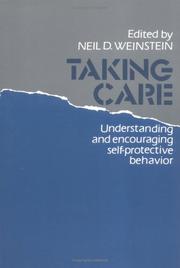| Listing 1 - 8 of 8 |
Sort by
|
Book
ISBN: 9781609180027 Year: 2011 Publisher: New York Guilford Press
Abstract | Keywords | Export | Availability | Bookmark
 Loading...
Loading...Choose an application
- Reference Manager
- EndNote
- RefWorks (Direct export to RefWorks)
Self-perception --- Self-protective behavior --- Self psychology
Book
ISBN: 9781785922978 9781784506032 1784506036 Year: 2017 Publisher: London Philadelphia
Abstract | Keywords | Export | Availability | Bookmark
 Loading...
Loading...Choose an application
- Reference Manager
- EndNote
- RefWorks (Direct export to RefWorks)
Self-protective behavior. --- Interpersonal relations. --- Intimacy (Psychology)

ISBN: 1281307750 9786611307752 1593322895 9781593322892 9781593322021 159332202X Year: 2007 Publisher: New York LFB Scholarly Pub.
Abstract | Keywords | Export | Availability | Bookmark
 Loading...
Loading...Choose an application
- Reference Manager
- EndNote
- RefWorks (Direct export to RefWorks)
Crime prevention --- Self-protective behavior --- Victims of crimes --- Behavior, Self-protective --- Human behavior --- Crime --- Prevention of crime --- Public safety --- Research. --- Prevention --- Government policy --- National crime victimization survey report. --- National crime survey report

ISBN: 0521324351 0521154448 0511527764 9780521324359 9780511527760 9780521154444 Year: 1987 Publisher: Cambridge Cambridge University press
Abstract | Keywords | Export | Availability | Bookmark
 Loading...
Loading...Choose an application
- Reference Manager
- EndNote
- RefWorks (Direct export to RefWorks)
Taking Care examines the reasons why people take precautions - and the reasons why they do not. Some authors offer theoretical perspectives on issues ranging from the cognitive processes of the individual to the values and historical trends in the larger society to illuminate the puzzle of self-protective behaviour. Others look at prevention programmes themselves: the forms they take, the assumptions they make, and the success or failure they meet. A unique feature of the book is its attention to different types of hazards and its integration of the knowledge that has been gained from research and practical experience in health promotion, natural hazards preparedness, occupational safety and health, consumer safety and community crime prevention. The underlying questions addressed in these different fields of study are much the same, but in the past there has been little communication.
Self-protective behavior --- Health behavior --- Congresses --- Health Promotion. --- Primary Prevention. --- -Self-protective behavior --- -Behavior, Self-protective --- Human behavior --- Behavior, Health --- Health habits --- Diseases --- Habit --- Health attitudes --- Medicine and psychology --- Prevention, Primordial --- Primordial Prevention --- Prevention, Primary --- Preventions, Primordial --- Primordial Preventions --- Preventive Dentistry --- Preventive Health Services --- Prophylactic Surgical Procedures --- Promotional Items --- Health Campaigns --- Promotion of Health --- Wellness Programs --- Campaign, Health --- Campaigns, Health --- Health Campaign --- Health Promotions --- Item, Promotional --- Items, Promotional --- Program, Wellness --- Programs, Wellness --- Promotion, Health --- Promotional Item --- Promotions, Health --- Wellness Program --- Health Education --- Preventive Medicine --- Causes and theories of causation --- Health Promotion --- Primary Prevention --- Congresses. --- congresses. --- -Congresses --- Disease Prevention, Primary --- Disease Preventions, Primary --- Primary Disease Prevention --- Primary Disease Preventions --- Behavior, Self-protective --- Health Sciences --- Psychiatry & Psychology --- Self-protective behavior - Congresses --- Health behavior - Congresses
Book
ISBN: 0444428380 Year: 1987 Publisher: Amsterdam Elsevier
Abstract | Keywords | Export | Availability | Bookmark
 Loading...
Loading...Choose an application
- Reference Manager
- EndNote
- RefWorks (Direct export to RefWorks)
Hygiene. Public health. Protection --- Accident Prevention. --- Behavior. --- Psychological Theory. --- Industrial safety --- Self-protective behavior --- #TWER:BOEK --- Behavior, Self-protective --- Human behavior --- Industrial accidents --- Industries --- Job safety --- Occupational hazards, Prevention of --- Occupational health and safety --- Occupational safety and health --- Prevention of industrial accidents --- Prevention of occupational hazards --- Safety, Industrial --- Safety engineering --- Safety measures --- Safety of workers --- Accidents --- System safety --- Psychologic Theory --- Psychological Theories --- Theories, Psychological --- Theory, Psychological --- Psychologic Theories --- Theories, Psychologic --- Theory, Psychologic --- Acceptance Process --- Acceptance Processes --- Behaviors --- Process, Acceptance --- Processes, Acceptance --- Prevention, Accident --- Accident Preventions --- Preventions, Accident --- Prevention --- prevention & control --- Industrial safety. --- Self-protective behavior. --- Accident prevention. --- Accident Prevention --- Behavior --- Psychological Theory --- Social Cognitive Theory --- Cognitive Theories, Social --- Cognitive Theory, Social --- Social Cognitive Theories --- Theories, Social Cognitive --- Theory, Social Cognitive
Book
ISBN: 9781409405511 9781409405528 1409405516 1409405524 1283015153 9786613015150 1317160355 1317160363 9781315573991 9781317160342 9781317160359 1315573997 Year: 2011 Publisher: Farnham, Surrey, England ; Burlington (Vt.) : Ashgate,
Abstract | Keywords | Export | Availability | Bookmark
 Loading...
Loading...Choose an application
- Reference Manager
- EndNote
- RefWorks (Direct export to RefWorks)
European nobility faced a number of religious, political and military challenges. Many sought to increase their status, or maintain their privileges, by negotiating with various political and religious authorities, and exploiting opportunities in this era of upheaval. In examining the protective strategies nobles adopted in an age of state-building, reformation and expansion, this collection reveals the roles of the 'second order' and their ability to survive. Scholars across disciplinary and national boundaries offer exciting new perspectives on this central social group.
Nobility --- Spatial behavior --- Self-protective behavior --- Contests --- Power (Social sciences) --- Dominance (Psychology) --- Social change --- Noblesse --- Comportement spatial --- Concours et compétitions --- Pouvoir (Sciences sociales) --- Dominance (Psychologie) --- Changement social --- History. --- History --- Social aspects --- Histoire --- Aspect social --- Europe --- Social conditions --- Conditions sociales --- Contests -- Social aspects -- Europe -- History. --- Dominance (Psychology) -- Europe -- History. --- Europe -- Social conditions -- 16th century. --- Europe -- Social conditions -- 17th century. --- Europe -- Social conditions -- 18th century. --- Nobility -- Europe -- History. --- Power (Social sciences) -- Europe -- History. --- Self-protective behavior -- Social aspects -- Europe -- History. --- Social change -- Europe -- History. --- Spatial behavior -- Europe -- History. --- Communities - Social Classes --- Prize competitions --- Behavior, Self-protective --- Change, Social --- Cultural change --- Cultural transformation --- Societal change --- Socio-cultural change --- Social history --- Social evolution --- Social hierarchy (Psychology) --- Control (Psychology) --- Social groups --- Empowerment (Social sciences) --- Political power --- Exchange theory (Sociology) --- Political science --- Social sciences --- Sociology --- Consensus (Social sciences) --- Competitions --- Awards --- Human behavior --- Behavior, Spatial --- Proxemic behavior --- Space behavior --- Spatially-oriented behavior --- Psychology --- Space and time --- NOBLESSE --- ASPECT SOCIAL --- 16E-18E SIECLES --- 16e-18e siècles --- 16e-18e siècles
Book
ISBN: 0582441323 9780582441323 Year: 1974 Publisher: Harlow Longman
Abstract | Keywords | Export | Availability | Bookmark
 Loading...
Loading...Choose an application
- Reference Manager
- EndNote
- RefWorks (Direct export to RefWorks)
Animal ethology and ecology. Sociobiology --- Animal defenses --- 591.57 --- Animal defence mechanisms --- Animal defences --- Animal defense mechanisms --- Animal defensive mechanisms --- Animal self-protection --- Animals --- Defence mechanisms, Animal --- Defences, Animal --- Defense mechanisms, Animal --- Defenses, Animal --- Defensive mechanisms, Animal --- Mechanisms, Animal defense --- Self-defense in animals --- Self-protection in animals --- Self-protective behavior in animals --- Animal behavior --- Animal ecology --- Animal weapons --- Defence. Attack --- Defenses --- Animal behavior. --- Animal defenses. --- 591.57 Defence. Attack
Book
ISBN: 3036550453 3036550461 Year: 2022 Publisher: Basel MDPI - Multidisciplinary Digital Publishing Institute
Abstract | Keywords | Export | Availability | Bookmark
 Loading...
Loading...Choose an application
- Reference Manager
- EndNote
- RefWorks (Direct export to RefWorks)
The risk of physical accident or injury to humans from horses is well understood. Now, there is increasing awareness of negative impacts on the physical and mental wellbeing of horses from living in fundamentally human environments and being subject to human management regimes. The 17 articles in this collection describe horse-related risks to humans and human-related risks to horses across a range of equestrian disciplines, sectors and activities. Not only do the authors take detailed approaches towards describing and calculating risk, they suggest solutions-focussed interventions for reducing the consequence and likelihood of harm to horses and humans in their relations with one another. Together, these important articles provide strategies for maximising the mutual benefits of humans and horses in each other’s lives. By considering human, animal and environmental aspects of horse-related risk, this collection provides a foundation for the development of an ‘Equestrian One Health’ framework to underpin future research into horse-related risks.
Research & information: general --- Biology, life sciences --- Animals & society --- horse-riding --- risk --- mitigation --- culture --- research --- review --- safety --- behavior change --- eque-culture --- motivator --- equestrian --- horse --- injury --- helmet --- online forum --- barriers --- enablers --- injury prevention --- horse-rider --- road safety --- decision-making vehicle --- Australia --- jockey --- economic --- costs --- insurance --- horse-related --- accident --- student --- education --- veterinary --- bedding material --- respiratory health --- peat --- wood shaving --- thoroughbred --- horse-racing --- steeplechase --- hurdles --- animal-human relationships --- media --- public debate --- horse stable --- management --- web tool --- transport --- journey duration --- season --- human–horse risk --- context-specificity --- attention --- cognitive error --- self-reference --- horses --- eventing --- falls --- riders --- human−animal relationships --- human−horse relationships --- protective behavior --- equestrians --- horse-related accidents --- safety equipment --- multiple regression analysis --- ethology --- equitation science --- learning theory --- behaviour change --- fireworks --- anxiety --- behaviour --- fear --- people --- WHS --- deaths --- workplace --- horse racing
| Listing 1 - 8 of 8 |
Sort by
|

 Search
Search Feedback
Feedback About UniCat
About UniCat  Help
Help News
News